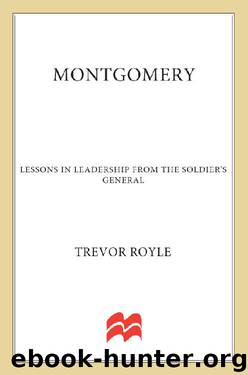Montgomery by Trevor Royle

Author:Trevor Royle [Royle, Trevor]
Language: eng
Format: epub
Publisher: St. Martin's Publishing Group
Published: 2010-06-15T04:00:00+00:00
CHAPTER EIGHT
The Invasion of Europe
MANY OF THE COMMAND AND CONTROL PROBLEMS THAT HAD BEDEVILED the Sicilian campaign were carried over to the Allied invasion of Italy, which began in September 1943. General Harold Alexander remained in command of the 15th Army Group, and Montgomery commanded the British Eighth Army, while Lieutenant General Mark Clark commanded the U.S. Fifth Army, which included British X Corps. The plan was for the British to land at Reggio Calabria on the other side of the Strait of Messina (Operation Slapstick) while Clark’s army landed south of Naples at Salerno (Operation Avalanche). Both invasions enjoyed mixed fortunes. The British landed unopposed, but Clark’s army encountered stubborn resistance from German land and air forces, and only intervention by the Royal Navy allowed the landing to proceed by the middle of the month. Although both armies then made progress in their advance northward, lack of firm operational planning meant that the campaign quickly devolved into a slog. Bad weather also wreaked havoc in the advance to the Garigliano and Sangro rivers, leaving Montgomery to complain to the Chief of the Imperial General Staff (CIGS), Alan Brooke, that there could be no hope of immediate progress in the near future. An absence of realizable goals and the use of inchoate tactics caused the Italian campaign to founder. There was no timetable; attacks were uncoordinated; the German defenders fought with unexpected tenacity; and the mountainous terrain favored the defenders. Offensive operations came to a virtual halt with the onset of winter at the end of the year. Slowly the Allies were being sucked into a war of attrition, a possibility that Montgomery had noted in his diary on September 20. The Allies had, he wrote, “embarked on a major campaign on the continent of europe, without having any clear idea—or plan—as to how they would develop the operations and fight the land battle.” He also offered the sardonic comment that his Eighth Army would probably be asked to relieve the situation.1
There is more to the latter comment than injured pride. Although Montgomery has been criticized for the methodical and ponderous way in which he directed the Eighth Army in the aftermath of El Alamein, he had achieved all the objectives given to him. North Africa had been cleared of enemy forces, and Sicily had been captured, and the instrument of success had largely been the Eighth Army and its commander. On the other hand, Montgomery had been hampered by vague and frequently contradictory orders from 15th Army Group headquarters. By trying to be all things to all people, Alexander had lost control of those under his command and frequently displayed an alarming lack of “grip” on what was actually happening on the battlefield. This had been the case in Sicily, and the Italian campaign showed that little had changed. In a later appreciation, written from Italy in November, Montgomery remarked of his former student at Staff College, “ALEXANDER is my great friend. But he does not understand the business, and he is not clever; he cannot grasp the essentials.
Download
This site does not store any files on its server. We only index and link to content provided by other sites. Please contact the content providers to delete copyright contents if any and email us, we'll remove relevant links or contents immediately.
Hit Refresh by Satya Nadella(9140)
The Compound Effect by Darren Hardy(8974)
Change Your Questions, Change Your Life by Marilee Adams(7786)
Nudge - Improving Decisions about Health, Wealth, and Happiness by Thaler Sunstein(7711)
The Black Swan by Nassim Nicholas Taleb(7135)
Deep Work by Cal Newport(7089)
Rich Dad Poor Dad by Robert T. Kiyosaki(6642)
Daring Greatly by Brene Brown(6516)
Principles: Life and Work by Ray Dalio(6457)
Playing to Win_ How Strategy Really Works by A.G. Lafley & Roger L. Martin(6315)
Man-made Catastrophes and Risk Information Concealment by Dmitry Chernov & Didier Sornette(6022)
Big Magic: Creative Living Beyond Fear by Elizabeth Gilbert(5778)
Digital Minimalism by Cal Newport;(5767)
The Myth of the Strong Leader by Archie Brown(5511)
The Slight Edge by Jeff Olson(5420)
Discipline Equals Freedom by Jocko Willink(5391)
The Motivation Myth by Jeff Haden(5214)
The Laws of Human Nature by Robert Greene(5213)
Stone's Rules by Roger Stone(5089)
